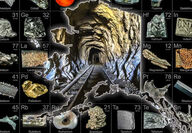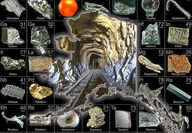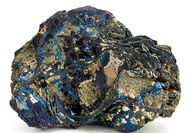Sorted by date Results 1 - 14 of 14

From the Pentagon's multi-million-dollar investment in Graphite One Inc. to China's restrictions on the exports of gallium and germanium, Alaska's current critical minerals supply and future potential was in the headlines and subtext of American news stories over the past month. Alaska as a future source of minerals critical to the clean energy transition grabbed headlines after the mid-July news that the U.S. Department of Defense awarded Graphite One Inc. $37.5 million to...

From antimony historically mined near the Interior Alaska city of Fairbanks to the zinc and germanium produced at the Red Dog Mine, America's 49th State is a past producer, and a potential future source of the minerals and metals deemed critical to the United States. Earlier this year U.S. Geological Survey updated and expanded its list of critical minerals to include 50 minerals and metals essential to the economic or national security of the U.S. and which has a supply...

In addition to being a past producer and a future source of most of the 35 minerals and metals considered critical to the United States, Alaska currently contributes a globally significant amount of one of these vital metals – germanium. While not a widely known metal, germanium has optical qualities that make it an important ingredient in fiber-optics, infrared optics, electronics and solar energy systems. "The extensive use of germanium for military and commercial a...

With nearly indistinguishable physical and chemical properties, niobium and tantalum are almost always found together in nature. Both are also critical to the defense, energy and high-tech sectors in the United States, but neither are mined domestically. For these reasons, the United States Geological Survey considers these transition metals "indispensable twins" that are critical to America's economic and strategic wellbeing. "Niobium and tantalum are transition metals that...

With a melting point of 5,756 degrees Fahrenheit and a heat-stable crystalline structure, rhenium is extremely resistant to both heat and wear. This durability makes it a vital element in superalloys used in jet and industrial gas turbine engines. "The high-temperature properties of rhenium allow turbine engines to be designed with finer tolerances and operate at temperatures higher than those of engines constructed with other materials," the United States Geological Survey...

Titanium conjures images of the durable and lightweight metal used to build aircraft, replacement hips, high-end bicycle frames and even quality golf clubs. While its outstanding weight-to-strength ratio and corrosion resistance makes this critical metal ideal for these applications, roughly 93 percent of the world's titanium is used to impart a stark whiteness to many of the consumer goods we use every day. "Titanium is different than most other metallic elements in that it...

While not the flashiest of the 35 minerals on the United States Geological Survey's critical list, barite plays an essential role in America's energy sector. Barite got its name from the Ancient Greek word for heavy, barús, and it is the high specific gravity that earned this mineral its name that makes it a critical mineral. Added to drill mud, a solution that serves multiple purposes in bore drilling, barite's weight helps maintain the integrity of the drill hole and...

Extremely hard and with the highest melting point of all the elements on the periodic table, tungsten is a vital ingredient to a wide-range of industrial and military applications, yet none of this durable metal is currently mined in the United States. According to the United States Geological Survey, more than half of the tungsten consumed in the U.S. last year was used to make the cemented tungsten-carbide, a compound typically made with equal parts tungsten and carbon....

A vital ingredient in stainless steel and superalloys, chromium is considered by the United States Geological Survey as "one of the Nation's most important strategic and critical materials." "Because there is no viable substitute for chromium in the production of stainless steel and because the United States has small chromium resources, there has been concern about domestic supply during every national military emergency since World War I," the USGS explains. Rich chromite...

Cobalt is an essential ingredient to optimizing the performance of batteries in the growing number of electric vehicles on global highways, yet essentially none of this battery metal is mined in the United States. With at least one advanced stage exploration project in Alaska looking into the potential of producing cobalt alongside its copper, America's 49th State could provide a domestic source for this critical metal. In its annual report, Mineral Commodity Summaries 2018,...

Primarily associated with cans, cups and roofs, tin may not be the flashiest metal on the market, but it has been a strategic metal that has defined human progress since the onset of the Bronze Age around 5,500 years ago and is on the list of minerals critical to the security of the United States even today, according to the U.S. Geological Survey. "In a congressionally mandated U.S. Department of Defense study of strategic minerals published in 2013, tin was shown to have...

Before color televisions hit the markets in the 1960s, rare earths where a curious group of elements that had the distinction of occupying their own separate section at the bottom of the periodic table but had very few practical applications. Over the ensuing 50 years, however, this group of 15 lanthanides plus yttrium and scandium have been discovered to possess unique properties that make them key ingredients in a wide range of modern products such as terabyte hard-drives...

Graphite is among the 23 metals and minerals the U.S. Geological Survey deemed critical to "the national economy and national security of the United States" in a December report, "Critical Mineral Resources of the United States – Economic and Environmental Geology and Prospects for Future Supply." One of the reasons the USGS considers graphite critical is the growing demand of this mineral as anode material in the lithium-ion batteries that power electric vehicles and a r...

The Trump Administration's focus on securing domestic sources of critical minerals could help re-invigorate mineral exploration and mine development in Alaska. At least 15 of the 23 critical minerals identified by the U.S. Geological Survey – antimony, barite, beryllium, cobalt, fluorspar, gallium, germanium, graphite, indium, platinum group elements, rare earth elements, rhenium, tantalum, tellurium, tin and vanadium – are found across the Far North state. Working alo...